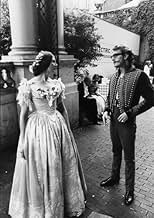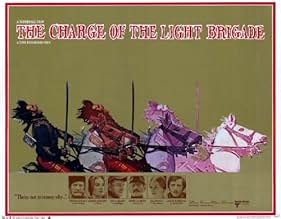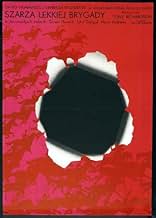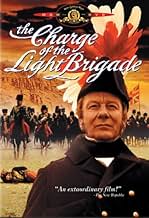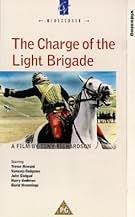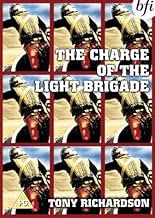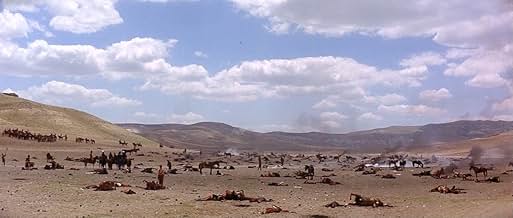In 1854, during the Crimean War, poor planning leads to the British Light Brigade openly charging a Russian artillery position with tragic consequences.In 1854, during the Crimean War, poor planning leads to the British Light Brigade openly charging a Russian artillery position with tragic consequences.In 1854, during the Crimean War, poor planning leads to the British Light Brigade openly charging a Russian artillery position with tragic consequences.
- Nominated for 7 BAFTA Awards
- 7 nominations total
John J. Carney
- Trooper Mitchell
- (as John Carney)
Howard Marion-Crawford
- Lt. Gen. Sir George Brown
- (as Howard Marion Crawford)
Christopher Cunningham
- Farrier
- (as Chris Cunningham)
- Director
- Writers
- All cast & crew
- Production, box office & more at IMDbPro
Storyline
Did you know
- TriviaFilming was immensely problematic. Director Tony Richardson fired a stunt coordinator whose manic swordplay killed several horses. An earthquake destroyed the hotel used by the production. David Hemmings was extremely temperamental on-set. The crew and extras, many of whom were Turkish soldiers, fought verbally and physically with local villagers who resented their incursion into the area. Richardson's strange mixture of perfectionism and historical flippancy grated on both his crew and advisers. While filming the final battle, the soldiers were called away for a NATO war exercise, forcing Richardson to shoot the scene with only a few dozen stuntmen.
- GoofsThe character called Featherstonehaugh (played by Corin Redgrave) has his name pronounced more or less as it is written, with four syllables. An upper-class Englishman of the mid-19th century (or, indeed, today) would pronounce it "Fanshawe".
- Quotes
Lord Raglan: It will be a sad day for England when her armies are officered by men who know too well what they are doing - it smacks of murder.
- Crazy creditsIn the animation over the opening credits, the English lion roars just as "A Woodfall Film" appears onscreen (mimicking Leo the Lion at the start of Metro-Goldwyn-Mayer movies).
- Alternate versionsAlthough the cinema version was complete the 1993 UK video release was cut by 7 secs to edit footage of horse-falls. The 2008 Optimum DVD has the cuts length extended to 14 secs and features the 6 minutes shorter print as mentioned below.
- ConnectionsFeatured in Otley (1969)
- SoundtracksThe Girl I Left Behind Me
(uncredited)
Traditional
Arranged by Trevor L. Sharpe
Heard before the Battle of the Alma
Featured review
Let's make it very clear from the outset, this version of The Charge of The Light Brigade is in no way a remake of the Errol Flynn film that Warner Brothers did in 1936. This is a factual account about how several hundred of the best of that generation in the United Kingdom met their deaths in the Crimea.
Great Britain from the end of the Napoleonic Wars until the beginning of World War I was only involved in two formally declared conflicts. Although many British folks will cite various colonial enterprises, the only two major wars the British were involved in were the Crimean War and the Boer War. And it was only the Crimean War which involved them with and against other European powers, in this case Russia.
It all was about propping up the Ottoman Empire and keeping the Russians from getting a hold of Istanbul and an outlet to the Mediterranean Sea for their fleet. The problem was all the powers were woefully unprepared for such a war, British included.
The Charge of the Light Brigade as no other film explores the incredible ineptitude of the British Army at that time. Today it beggars the imagination that field grade officers simply purchased their commissions. It's true though, it's the reason why Lord Raglan, Lord Cardigan, and Lord Lucan a group of Colonel Blimps if there ever were, got in charge of things.
It's how it was done, the high army positions were reserved for their aristocracy. The Duke of Wellington had died in 1852, three years before the Crimean War and the charge. He also purchased his commission back in the day. It was just dumb luck that he happened to be a military genius. Lord Raglan who is played by John Gielgud was an able staff officer for Wellington, but as a strategist was hopelessly out of his depth.
Howewver the main two blunderers were a pair of quarreling in-laws, Lord Cardigan and Lord Lucan played by Trevor Howard and Harry Andrews. They would rather have sent their armies against each other than the Russians.
A lot of the best of that generation died charging the heights of Balaclava that day to get to Sevastapol because of these two mutts. In any kind of system based on merit these two would never have gotten to be sergeants let alone generals.
The Crimean War which basically ended as a stalemate because the Russians were as inept as the British led eventually to reform of the army. That reform came in the first ministry of William Gladstone (1868-1874)and his very able Secretary for War Lord Edward Cardwell who finally got Parliament to abolish purchase commissions and promotions were based on merit after that. Good thing too, because it staggers the imagination to think of the British Army going into World Wars I and II and the Boer War under the old system.
The charge at Balaclava gained its enduring legend through the popular poem of Alfred Lord Tennyson who was smart enough to romanticize the Noble Six Hundred instead of their inept leadership The movie that Errol Flynn and Olivia DeHavilland starred in back in 1936 was a romantic story inspired by that poem.
What Tony Richardson and the cast he directed in 1968 bring you the real story of the charge. It's a graphically accurate account and military historians should love this film.
Great Britain from the end of the Napoleonic Wars until the beginning of World War I was only involved in two formally declared conflicts. Although many British folks will cite various colonial enterprises, the only two major wars the British were involved in were the Crimean War and the Boer War. And it was only the Crimean War which involved them with and against other European powers, in this case Russia.
It all was about propping up the Ottoman Empire and keeping the Russians from getting a hold of Istanbul and an outlet to the Mediterranean Sea for their fleet. The problem was all the powers were woefully unprepared for such a war, British included.
The Charge of the Light Brigade as no other film explores the incredible ineptitude of the British Army at that time. Today it beggars the imagination that field grade officers simply purchased their commissions. It's true though, it's the reason why Lord Raglan, Lord Cardigan, and Lord Lucan a group of Colonel Blimps if there ever were, got in charge of things.
It's how it was done, the high army positions were reserved for their aristocracy. The Duke of Wellington had died in 1852, three years before the Crimean War and the charge. He also purchased his commission back in the day. It was just dumb luck that he happened to be a military genius. Lord Raglan who is played by John Gielgud was an able staff officer for Wellington, but as a strategist was hopelessly out of his depth.
Howewver the main two blunderers were a pair of quarreling in-laws, Lord Cardigan and Lord Lucan played by Trevor Howard and Harry Andrews. They would rather have sent their armies against each other than the Russians.
A lot of the best of that generation died charging the heights of Balaclava that day to get to Sevastapol because of these two mutts. In any kind of system based on merit these two would never have gotten to be sergeants let alone generals.
The Crimean War which basically ended as a stalemate because the Russians were as inept as the British led eventually to reform of the army. That reform came in the first ministry of William Gladstone (1868-1874)and his very able Secretary for War Lord Edward Cardwell who finally got Parliament to abolish purchase commissions and promotions were based on merit after that. Good thing too, because it staggers the imagination to think of the British Army going into World Wars I and II and the Boer War under the old system.
The charge at Balaclava gained its enduring legend through the popular poem of Alfred Lord Tennyson who was smart enough to romanticize the Noble Six Hundred instead of their inept leadership The movie that Errol Flynn and Olivia DeHavilland starred in back in 1936 was a romantic story inspired by that poem.
What Tony Richardson and the cast he directed in 1968 bring you the real story of the charge. It's a graphically accurate account and military historians should love this film.
- bkoganbing
- Mar 2, 2008
- Permalink
- How long is The Charge of the Light Brigade?Powered by Alexa
Details
- Release date
- Country of origin
- Languages
- Also known as
- Juris lake konjice
- Filming locations
- Pecenek, Turkey(charge in the Valley of Death)
- Production company
- See more company credits at IMDbPro
Box office
- Budget
- $8,000,000 (estimated)
- Runtime2 hours 19 minutes
- Color
- Sound mix
- Aspect ratio
- 2.35 : 1
Contribute to this page
Suggest an edit or add missing content

Top Gap
By what name was The Charge of the Light Brigade (1968) officially released in India in English?
Answer

